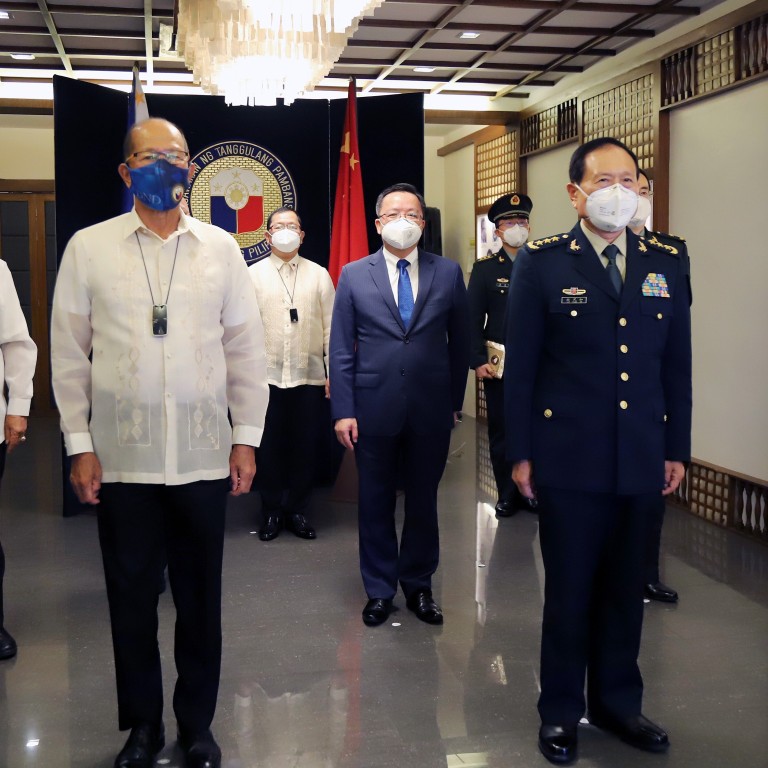
US-China rivalry in the South China Sea has the Philippines at its core, observers say
- Beijing and Washington know the value of Manila’s and its mercurial leader Rodrigo Duterte’s support, and they are willing to pay handsomely to get it
- Despite the Philippines pivoting closer to China in recent years, its ties with long-standing ally America on security issues remain ‘resilient’, says analyst Richard Heydarian
On Friday, the agriculture ministry in Manila announced that a US-funded animal disease laboratory had opened in the Central Luzon region, The Manila Bulletin reported.
In meetings with his counterpart, Delfin Lorenzana, and President Rodrigo Duterte, the two sides agreed to renew their 2004 memorandum of understanding on defence cooperation, and strive to better manage their disputes in the South China Sea.
The grandiose gestures by the US and China highlight the strategic importance the two powers give to the Philippines in the context of their military rivalry, observers say.

Derek Grossman, a senior defence analyst with the Rand Corporation, said the Philippines had real significance for the US not only as the host of its largest overseas naval base, but because it was its sole treaty ally with a direct involvement in the South China Sea disputes.
That relationship gave the US “a power projection point that is in the immediate vicinity of the South China Sea that would be extremely valuable in a future conflict”, he said.
“The US could manage without access to Philippine bases, but its power projection into the South China Sea would become more difficult and perhaps less rapid,” he said.
According to Kang Lin, a research fellow at Hainan University in southern China, it was partly because of the strength of that relationship between Manila and Washington that Beijing had been so keen to nurture relations with Duterte, as he was known for his occasional anti-American rhetoric.
Compared with his predecessors, Duterte, who took over as president in 2016, was much friendlier towards China and far tougher on the US on matters of foreign policy, he said.
Over the past four years, Beijing and Manila have signed billions of dollars worth of investment deals and established a so-called consultation mechanism to ease tensions on issues related to the resource-rich South China Sea.
“When disputes over fishing or oil exploration rights have broken out between rival claimants in the disputed waterway, the Philippines has played a key role in helping to reduce the pressure on China,” Kang said. “It is very important to Beijing’s South China Sea strategy.”
US spy planes posing as airliners ‘serious threat’ in South China Sea
Grossman said Beijing had seen an opportunity to pull the Philippines into its orbit and was doing all it could to tear it away from its long-standing ally, the US.
“Doing so could weaken US military agreements with the Philippines that are designed not only to help Manila with its counterterrorism operations, but also counter China’s ambitions and activities in the disputed South China Sea,” he said.
The US held close to 300 military exercises with the Philippines last year, more than with any other of its Indo-Pacific allies.
US Secretary of State Mike Pompeo said last year that the mutual defence treaty between the two countries covered the South China Sea, while ambassador Kim said it also applied to the militia and armed civilians Beijing had been accused of using to bully and intimidate rival claimants in the waterway.
In a significant shift in its South China Sea policy, Washington said in July that it rejected most of Beijing’s claims to the disputed waters, effectively backing the ruling made by an international tribunal in The Hague in 2016 that was brought by the Philippines against China.
“Manila’s victory made it easy for Washington to say that Beijing’s nine-dash line claims are essentially null and void,” Grossman said.
China starts military drill as US diplomat arrives in Taiwan
Although Duterte has pivoted towards China there have been questions as to how long the cordial relations between Beijing and Manila can be maintained, especially as most of China’s investment promises remain unfulfilled.
“On one hand, Duterte wanted to reduce the overreliance on the US,” Heydarian said. “On the other, other top officials and the establishment want to make sure he doesn’t pivot all the way to China and undermine relations with the US, especially amid the South China Sea disputes.”
With Duterte set to step down as president in 2022, Kang said it was essential Beijing did all it could now to cement ties with Manila.
“The next president, no matter who it is, is unlikely to be as China-friendly as Duterte has been,” he said.

